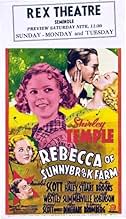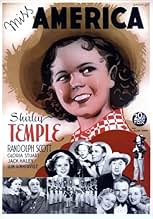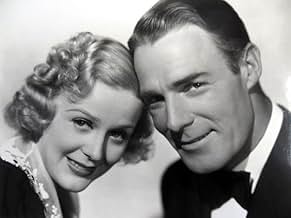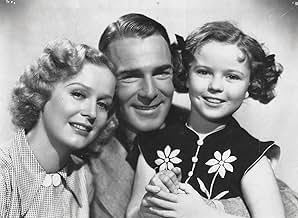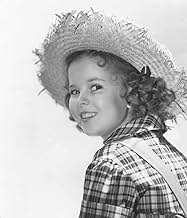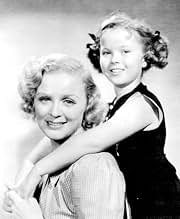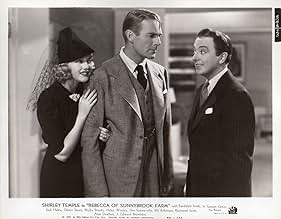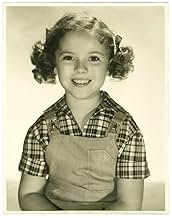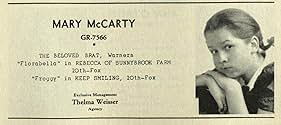PUNTUACIÓN EN IMDb
7,0/10
2 mil
TU PUNTUACIÓN
Añade un argumento en tu idiomaRebecca's Uncle Harry leaves her with Aunt Miranda who forbids her to associate with show people. But neighbor Anthony Kent is a talent scout who secretly sets it up for her to become a radi... Leer todoRebecca's Uncle Harry leaves her with Aunt Miranda who forbids her to associate with show people. But neighbor Anthony Kent is a talent scout who secretly sets it up for her to become a radio broadcaster.Rebecca's Uncle Harry leaves her with Aunt Miranda who forbids her to associate with show people. But neighbor Anthony Kent is a talent scout who secretly sets it up for her to become a radio broadcaster.
- Dirección
- Guión
- Reparto principal
- Premios
- 2 premios y 1 nominación en total
Raymond Scott and His Quintet
- Raymond Scott and His Quintet
- (as Raymond Scott Quintet)
Clarence Wilson
- Jake Singer
- (as Clarence Hummel Wilson)
Reseñas destacadas
7sol-
A pleasant if not brilliant Shirley Temple vehicle, the young actress shines as the charming Rebecca and she sings quite well too. The film itself is formulaic and very predictable with typical characters, but it nevertheless does the job reasonably well, providing an opportunity for Temple to display her talents as and actress and as a singer. The songs are a delight to listen too as well. The main setback for the film is the amateurish editing - at least three or four times continuity is broken by the presence of jump cuts - however this can easily be ignored in light of the charms of the film. It supposedly is not faithful to the source material, but as a film on its own, it does fine.
A frantic radio producer must find the perfect Little Miss America for an advertiser's national program. He discovers her in his country neighbor, REBECCA OF SUNNYBROOK FARM, an incredibly talented & precocious moppet, who proceeds to charm all around her & bring happiness into the lives of those who love her.
Little Shirley Temple turns in another crowd-pleasing performance in this pleasant family film - which bears almost no resemblance to the Kate Douglas Wiggin classic. It's easy to see why the little tyke was Hollywood's top star for years. Her smile & vivacity are still stunning decades later.
This time Shirley is surrounded by a plethora of male talent: rugged Randolph Scott, giving a slightly wooden performance no doubt caused by the chagrin of playing second fiddle to a ten-year-old; peppy Jack Haley, always eager to please; veteran William Demerest, displaying some of his best pratfalls; laconic comic Slim Summerville, the unlikeliest lover; flustered Franklin Pangborn, as a very nervous organist; and the great Bill `Bojangles' Robinson, given distressingly little to do in his role as a farmhand - until the film's final moments when he gets to shine in a tap routine with Shirley.
Helen Westley is great fun as grumpy Aunt Miranda; lovely Gloria Stuart is given little to do except look, well, lovely.
That's champion character actress Eily Malyon as the Reverend's cake-eating wife. Movie mavens will recognize old Clarence Wilson as a shyster attorney.
Shirley sings `An Old Straw Hat' & `Come And Get Your Happiness', as well as a medley of her past hits.
Query: Why do film makers think radio audiences are thrilled by listening to tap dancing? In films like this you don't ask questions like that.
Little Shirley Temple turns in another crowd-pleasing performance in this pleasant family film - which bears almost no resemblance to the Kate Douglas Wiggin classic. It's easy to see why the little tyke was Hollywood's top star for years. Her smile & vivacity are still stunning decades later.
This time Shirley is surrounded by a plethora of male talent: rugged Randolph Scott, giving a slightly wooden performance no doubt caused by the chagrin of playing second fiddle to a ten-year-old; peppy Jack Haley, always eager to please; veteran William Demerest, displaying some of his best pratfalls; laconic comic Slim Summerville, the unlikeliest lover; flustered Franklin Pangborn, as a very nervous organist; and the great Bill `Bojangles' Robinson, given distressingly little to do in his role as a farmhand - until the film's final moments when he gets to shine in a tap routine with Shirley.
Helen Westley is great fun as grumpy Aunt Miranda; lovely Gloria Stuart is given little to do except look, well, lovely.
That's champion character actress Eily Malyon as the Reverend's cake-eating wife. Movie mavens will recognize old Clarence Wilson as a shyster attorney.
Shirley sings `An Old Straw Hat' & `Come And Get Your Happiness', as well as a medley of her past hits.
Query: Why do film makers think radio audiences are thrilled by listening to tap dancing? In films like this you don't ask questions like that.
Lately, I have watched a bunch of Shirley Temple movies. I used to think they were all very schmaltzy, but this isn't always the case. Plus, since she was such a lovable and adorable child, even a bit of schmaltz manages to work. Of the dozen or so Temple films I've seen in the last month, I would place "Rebecca of Sunnybrook Farm" among the very best. And, after over 70 years, it's still very enjoyable.
This film begins with Rebecca being shuttled about by her no-good uncle (William Demarest) from one audition to another. At the final audition, Rebecca wows the producer (Randolph Scott) and sponsor but the dumb assistant (Jack Haley) tells the girl that she was rejected when she really wasn't. At the end of their ropes, the uncle dumps the child on her aunt--an old grouch living at Sunnybrook Farm. The aunt is happy to take the child and Rebecca soon endears herself to everyone (big surprise). In a coincidence you'll only see in movies, her new neighbor happens to be the producer--who has been frantically searching for the child for his show. But, when he eventually discovers who she is, the aunt is not about to let the girl 'ruin her life by going into show business'! What's next? See the film.
While the film has almost nothing to do with the novel "Rebecca of Sunnybrook Farm", it manages to work very, very well. Much of it is the writing--the script has a nice sense of humor and is better written than normal. In addition, a wonderful supporting cast helps by not placing all the film on the shoulders of little Shirley. In addition to Haley, Demarest and Scott, Gloria Stuart, Slim Summerville and Bill Robinson round out the cast. Overall, a treat--a Shirley Temple film that manages to make you smile and keeps the saccharine level in check. Well worth your time. Plus, it made my wife laugh and smile throughout--a positive statement indeed as she's even more cynical than me when it comes to films.
This film begins with Rebecca being shuttled about by her no-good uncle (William Demarest) from one audition to another. At the final audition, Rebecca wows the producer (Randolph Scott) and sponsor but the dumb assistant (Jack Haley) tells the girl that she was rejected when she really wasn't. At the end of their ropes, the uncle dumps the child on her aunt--an old grouch living at Sunnybrook Farm. The aunt is happy to take the child and Rebecca soon endears herself to everyone (big surprise). In a coincidence you'll only see in movies, her new neighbor happens to be the producer--who has been frantically searching for the child for his show. But, when he eventually discovers who she is, the aunt is not about to let the girl 'ruin her life by going into show business'! What's next? See the film.
While the film has almost nothing to do with the novel "Rebecca of Sunnybrook Farm", it manages to work very, very well. Much of it is the writing--the script has a nice sense of humor and is better written than normal. In addition, a wonderful supporting cast helps by not placing all the film on the shoulders of little Shirley. In addition to Haley, Demarest and Scott, Gloria Stuart, Slim Summerville and Bill Robinson round out the cast. Overall, a treat--a Shirley Temple film that manages to make you smile and keeps the saccharine level in check. Well worth your time. Plus, it made my wife laugh and smile throughout--a positive statement indeed as she's even more cynical than me when it comes to films.
Shirley Temple definitely deserved some of her popularity after this tailor-made vehicle. The film is as adorable as the young star. It follows Rebecca (Temple) as she tries to fulfill her dream of singing on a popular radio show. She does this with the help of a few adult friends who compliment Temple perfectly. Temple herself, shines in this film. Singing, dancing and acting she shows a natural talent for performing and clearly enjoys herself with this film. All in all I would recommend this film to anyone. It might not be the best Shirley Temple film but it will keep you entertained all the way through and the enchanting lead will captivate you.
REBECCA OF SUNNYBROOK FARM (20th Century-Fox, 1938), directed by Allan Dwan, stars Shirley Temple as the title character in a screenplay suggested on but not entirely from the story written by Kate Douglas Wiggin. Returning to the formula best suited for Temple's musical talents following her performances in the more faithful adaptations to the literary works of 1937's WEE WILLIE WINKIE and HEIDI, REBECCA is actually a rehash of Temple's earlier effort, THE POOR LITTLE RICH GIRL (1936), which not only has her singing some songs composed for that production, reuniting her with co-stars Jack Haley and Gloria Stuart, with much of the setting taking place in a radio station, but another well staged military dance number finish.
The story revolves around Anthony Kent (Randolph Scott), a radio station manager, assisted by Orville Smithers (Jack Haley), on a promotional talent search auditioning hundreds of little girls for their upcoming "Little Miss America" campaign sponsored by Cyrus Bartlett (Paul Harvey), an important client for Crackling Grain Flakes. Enduring through the intercom of listening of one bad singer after another vocalizing the same song of "You Got to Eat Your Spinach, Baby" over and over again, plus having to deal with overbearing parents, Kent finally gets to hear Rebecca Winstead's (Shirley Temple) singing and is very much impressed by her. However, due to a misunderstanding by Orville, Rebecca, accompanied by her stepfather/manager Harry Kipper (William Demarest), leave the studio thinking the audition a failure. Now that he has found himself evicted from their 950 10th Avenue apartment, and flat broke, Harry, who is unable to support his stepdaughter, decides to have Rebecca live upstate with her Aunt Miranda (Helen Westley) at Sunnybrook Farm. Realizing Orville's mistake, and now at this point of a nervous breakdown, Kent decides to get away from it all by taking a rest on his farm in the country, which also happens to be at Sunnybrook. Eventually the paths of Kent and Rebecca meet, thanks to a little piggy, and discovering that Rebecca is the talented child he's been searching for, he sets out to star her on the "Crackling Grain Flakes Hour," but there's only one problem, Aunt Miranda, who detests show people, especially since her late daughter had married an actor, refuses to give Rebecca permission to perform on the radio. Gwen (Gloria Stuart), Rebecca's first cousin, also living under Miranda's roof, and in love with Kent, schemes in having Rebecca sneak out at night on a hook to book broadcast set in Kent's home. All goes well, even after Miranda hears her on the radio, until Uncle Harry, now remarried to a tough babe (Ruth Gillette), returns to Sunnybrook Farm with an attorney (Clarence Wilson) to reclaim his talented stepchild.
Amusing moments consist of Haley's love for Scott's temperamental fiancée (played by Phyllis Brooks), who performs with him but refuses to give him the satisfaction; William Demarest's frequent pratfalls on Aunt Miranda's loose board in front of her home; and Helen Westley as the strong-willed Miranda, who continues to hold a grudge on Scott's servant, Homer Busby (wonderfully played by Slim Summerville), her former fiancé, due to some misunderstanding 25 years ago. One thing about Wesley's character, every time she speaks, one expects her to lay an egg. Also in the cast are Alan Dinehart as Mr. Purvis, Kent's radio station rival; J. Edward Bromberg as Doctor Hill; and best of all, Franklin Pangborn as Hamilton Montgomery, a substitute organ player waiting for his big chance to go on the air; and Bill Robinson as Miranda's dancing farm hand.
The motion picture soundtrack includes: "Happy Ending" (sung by Phyllis Brooks); "You've Got to Eat Your Spinach, Baby" (sung by individual auditioning girls); ""An Old Straw Hat" (sung by Shirley Temple); "Crackling Grain Flakes" (sung by quartet); "Alone With You" (sung by Phyllis Brooks and Jack Haley); "Come and Get Your Happiness" (sung by Temple/by Jack Yellen and Sam Polgrass); a medley of Temple oldies: "On the Good Ship Lollipop" (by Richard Whiting and Sidney Clare); "Animal Crackers in My Soup" (by Ted Koehler, Irving Caesar and Ray Henderson); "When I'm With You," "Oh, My Goodness," and "Goodnight, My Friends (formerly "Goodnight, My Love" (all sung by Temple); and "The Parade of the Wooden Soldiers" (performed by Temple and Bill Robinson/by Sidney Mitchell, Lew Pollack and Raymond Scott).
One of the better radio musicals of the period, Temple shines as the little girl who is very self-reliant. This is also the initial film in which she loses her legendary curls, which comes after living under Aunt Miranda's roof on Sunnybrook Farm. And speaking of legendary, her tap dancing opposite Bill Robinson ranks one of their better team efforts, even if the tapping takes place on the radio for listeners to hear and not see, except for the movie viewing audience. REBECCA OF SUNNYBROOK FARM is not the sort of movie for grammar school students to base a book report on, for that this is the least faithful of the earlier screen treatments, 1917 with Mary Pickford, and 1932 with Marian Nixon. It seems interesting that the writers didn't come upon a musical version to the book from which it is based, as MGM later did with THE WIZARD OF OZ (1939), and not stray away from its original concept, but overlooking these major changes, with no harm done, it does make fine family viewing.
Distributed on video cassette and later DVD, REBECCA OF SUNNYBROOK FARM is currently available in both colorized and black and white versions. Formerly shown on American Movie Classics from 1997 to 2001, other cable broadcasts include the Fox Movie Channel and Turner Classic Movies (TCM premiere: November 22, 2012). See youz in church.(***1/2)
The story revolves around Anthony Kent (Randolph Scott), a radio station manager, assisted by Orville Smithers (Jack Haley), on a promotional talent search auditioning hundreds of little girls for their upcoming "Little Miss America" campaign sponsored by Cyrus Bartlett (Paul Harvey), an important client for Crackling Grain Flakes. Enduring through the intercom of listening of one bad singer after another vocalizing the same song of "You Got to Eat Your Spinach, Baby" over and over again, plus having to deal with overbearing parents, Kent finally gets to hear Rebecca Winstead's (Shirley Temple) singing and is very much impressed by her. However, due to a misunderstanding by Orville, Rebecca, accompanied by her stepfather/manager Harry Kipper (William Demarest), leave the studio thinking the audition a failure. Now that he has found himself evicted from their 950 10th Avenue apartment, and flat broke, Harry, who is unable to support his stepdaughter, decides to have Rebecca live upstate with her Aunt Miranda (Helen Westley) at Sunnybrook Farm. Realizing Orville's mistake, and now at this point of a nervous breakdown, Kent decides to get away from it all by taking a rest on his farm in the country, which also happens to be at Sunnybrook. Eventually the paths of Kent and Rebecca meet, thanks to a little piggy, and discovering that Rebecca is the talented child he's been searching for, he sets out to star her on the "Crackling Grain Flakes Hour," but there's only one problem, Aunt Miranda, who detests show people, especially since her late daughter had married an actor, refuses to give Rebecca permission to perform on the radio. Gwen (Gloria Stuart), Rebecca's first cousin, also living under Miranda's roof, and in love with Kent, schemes in having Rebecca sneak out at night on a hook to book broadcast set in Kent's home. All goes well, even after Miranda hears her on the radio, until Uncle Harry, now remarried to a tough babe (Ruth Gillette), returns to Sunnybrook Farm with an attorney (Clarence Wilson) to reclaim his talented stepchild.
Amusing moments consist of Haley's love for Scott's temperamental fiancée (played by Phyllis Brooks), who performs with him but refuses to give him the satisfaction; William Demarest's frequent pratfalls on Aunt Miranda's loose board in front of her home; and Helen Westley as the strong-willed Miranda, who continues to hold a grudge on Scott's servant, Homer Busby (wonderfully played by Slim Summerville), her former fiancé, due to some misunderstanding 25 years ago. One thing about Wesley's character, every time she speaks, one expects her to lay an egg. Also in the cast are Alan Dinehart as Mr. Purvis, Kent's radio station rival; J. Edward Bromberg as Doctor Hill; and best of all, Franklin Pangborn as Hamilton Montgomery, a substitute organ player waiting for his big chance to go on the air; and Bill Robinson as Miranda's dancing farm hand.
The motion picture soundtrack includes: "Happy Ending" (sung by Phyllis Brooks); "You've Got to Eat Your Spinach, Baby" (sung by individual auditioning girls); ""An Old Straw Hat" (sung by Shirley Temple); "Crackling Grain Flakes" (sung by quartet); "Alone With You" (sung by Phyllis Brooks and Jack Haley); "Come and Get Your Happiness" (sung by Temple/by Jack Yellen and Sam Polgrass); a medley of Temple oldies: "On the Good Ship Lollipop" (by Richard Whiting and Sidney Clare); "Animal Crackers in My Soup" (by Ted Koehler, Irving Caesar and Ray Henderson); "When I'm With You," "Oh, My Goodness," and "Goodnight, My Friends (formerly "Goodnight, My Love" (all sung by Temple); and "The Parade of the Wooden Soldiers" (performed by Temple and Bill Robinson/by Sidney Mitchell, Lew Pollack and Raymond Scott).
One of the better radio musicals of the period, Temple shines as the little girl who is very self-reliant. This is also the initial film in which she loses her legendary curls, which comes after living under Aunt Miranda's roof on Sunnybrook Farm. And speaking of legendary, her tap dancing opposite Bill Robinson ranks one of their better team efforts, even if the tapping takes place on the radio for listeners to hear and not see, except for the movie viewing audience. REBECCA OF SUNNYBROOK FARM is not the sort of movie for grammar school students to base a book report on, for that this is the least faithful of the earlier screen treatments, 1917 with Mary Pickford, and 1932 with Marian Nixon. It seems interesting that the writers didn't come upon a musical version to the book from which it is based, as MGM later did with THE WIZARD OF OZ (1939), and not stray away from its original concept, but overlooking these major changes, with no harm done, it does make fine family viewing.
Distributed on video cassette and later DVD, REBECCA OF SUNNYBROOK FARM is currently available in both colorized and black and white versions. Formerly shown on American Movie Classics from 1997 to 2001, other cable broadcasts include the Fox Movie Channel and Turner Classic Movies (TCM premiere: November 22, 2012). See youz in church.(***1/2)
¿Sabías que...?
- CuriosidadesBill Robinson visited Shirley Temple at an exclusive and restricted hotel to rehearse the "Parade of the Wooden Soldiers" number for this film. Temple later recalled, "I asked Bill what cottage he was staying in. He told me, 'I'm staying in the chauffeur quarters above the garage.' It wasn't until years later that I understood why."
- PifiasShirley Temple's stunt double, with her head turned away from the camera, is very obviously not Shirley, as she climbs down the ladder.
- Citas
[last lines]
Rebecca Winstead: I always told you I was very self-reliant.
- Versiones alternativasIn 2005, a new colorized version appeared, prepared by Legend Films, replacing the older colorized version used for television and video.
- ConexionesFeatured in Grandes biografías: Shirley Temple: The Biggest Little Star (1996)
- Banda sonoraHappy Endings
(1938) (uncredited)
Music by Lew Pollack
Lyrics by Sidney D. Mitchell
Sung by Phyllis Brooks
Selecciones populares
Inicia sesión para calificar y añadir a tu lista para recibir recomendaciones personalizadas
- How long is Rebecca of Sunnybrook Farm?Con tecnología de Alexa
- DVD Chapter Titles.
Detalles
- Duración1 hora 21 minutos
- Color
- Relación de aspecto
- 1.37 : 1
Contribuir a esta página
Sugerir un cambio o añadir el contenido que falta

Principal laguna de datos
By what name was Rebecca of Sunnybrook Farm (1938) officially released in Canada in English?
Responde


